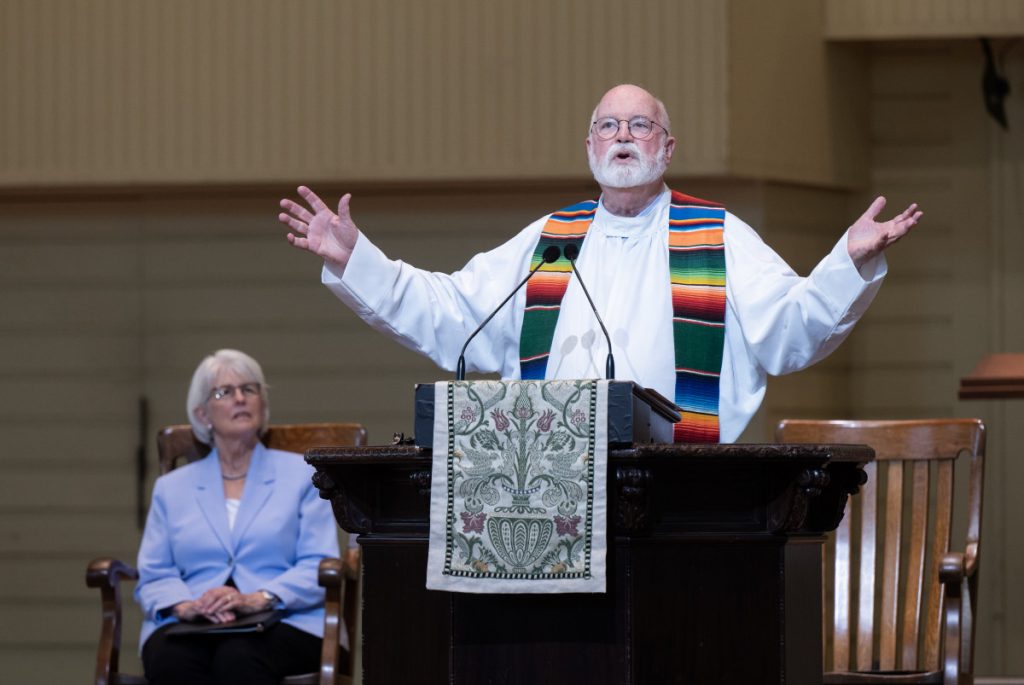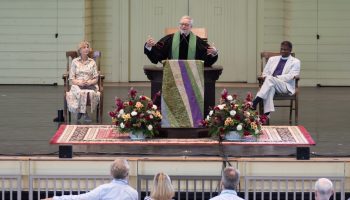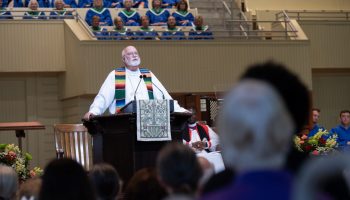
Fr. Greg Boyle, S.J., delivers his homily (not a sermon, he noted Thursday morning, as he is a Jesuit) on “The Stillness in charge” Sunday in the Amphitheater.
Fr. Greg Boyle, S.J., received a standing ovation when he was introduced at the 9:15 a.m. Friday morning worship service in the Amphitheater. When he finished preaching, he received another standing ovation.
In between, he told the congregation that although in the gospel reading, Jesus asking Peter, “Who do you say I am?” is important, for Boyle the question is, “How do you say it?”
Boyle’s sermon title was “Visible Entirely,” and the scripture reading was Matthew 16:13-19.
Homeboy Louie burst into Boyle’s office one day and said, “G, I need your divided attention.” Boyle replied, “You are in luck because that is exactly what you will get.”
The poet Mary Oliver said there were three important things to living life: pay attention, be astonished and share that astonishment. Boyle quoted her: “That God is invisible is quite understandable, but holiness is visible entirely.”
“Our astonished, attentive hearts are awakened to the God in ourself,” Boyle said. “It is not who (we say it about) but how we say it.”
At the Los Angeles Times Festival of Books one year, Boyle was on a panel talking about the philosophy of Homeboy Industries: “We believe that everybody is unshakeably good, no exceptions. We belong to each other, no exceptions.”
An audience member asked Boyle if he thought all the world’s complex problems would disappear if everyone practiced these two beliefs. “Yes, I do,” he answered. There was a lot of laughter.
“I was startled and I said again, ‘Yes, I do,’ ” Boyle said. “It is not who, but how.”
When you can see the Christ in you, you can see the Christ in another person.
“We have to live as though the truth is the truth, put first things first and live with kinship, connection and belonging,” he said.
Boyle was invited to speak in Sacramento and he brought Robert and Carlos — called chamuco, or devil in Spanish — with him. Carlos was called that because he had two devil’s horns tattooed on his forehead.
When they arrived they got on the shuttle to go from the airport to the rental car site, Carlos decided to sit in the very back of the shuttle, right in the middle. Everyone did a “foxtrot of avoidance” to not sit with him, but finally the seats on either side of him were occupied.
The road from the airport to the rental site ran through a dark wooded area. In the middle of it, the shuttle stopped running. No one said a word while the driver tried to get it going again.
Suddenly from the back of the bus, a voice said, “I saw this in a movie once. … It does not end well.” Everyone burst out laughing.
“In a divided country represented by the bus, everyone bursts into laughter,” Boyle said. “We are unanimous in saying how Jesus is, leading to our more perfect union.”
Indian author Arundhati Roy, Booker Prize winner for fiction in 1997 for her book The God of Small Things, wrote: “Another world is not only possible, she is on her way. On a quiet day, I can hear her breathing.”
“We don’t save our soul, we spend it. We choose to cherish. That is love with its sleeves rolled up,” Boyle said. “We may be less delightful, but God never delights in us less. To cherish is not about being less sinful, but about being more joyful.”
Often invited to speak at universities which “force their students to read my books,” Boyle was invited to his alma mater, Gonzaga University in Spokane, to talk to the incoming class, which had to read his book.
“I went even though they always ruin my bracket in March,” he said.
He always picks homies to go with him, usually from rival gangs. “I mess with them by making them share a hotel room. Many have never flown before and are in a panic,” Boyle said.
One homie said to Boyle, “We’re flying Virgin Airlines because it’s our first time, right?” Boyle replied, “Yes, it is a requirement. We are coming home on American.”
At Hollywood Burbank Airport on the flight to Spokane, Boyle spotted two flight attendants going up the stairs to the plane with cups of Starbucks in their hands. Larry and Mario were flying with him and Mario was actually hyperventilating over it. He asked Boyle, “When can we board?” Boyle replied, “As soon as they sober up the pilots.”
Mario has the most tattoos of anyone at Homeboy, even on his eyelids. The ones on his eyelids, Boyle quipped, are “ ‘The End,’ so everyone will have proof when he lays in his coffin.”
He continued, “It is only the soul that hyperventilates who fills the world with tenderness, and the changes are proof of how you say it.”
At Gonzaga, they were asked to not only do the large convocation, but meet with many smaller classes. Boyle would sit in the back and let Larry and Mario tell their stories.
“If stories were flames, you would have had to keep your distance,” Boyle said.
At the convocation they told their stories and then there was time for questions. The first one was for Mario. A woman asked, “You say you are a father to a son and daughter. What wisdom do you want to impart to them?”
Mario held tightly to the microphone and closed his eyes.
“I just …” he began.
As he fought his tears, he finally said, “I just don’t want my kids to turn out like me.”
The woman, who was crying too, responded, “Why not? You are loving, kind, gentle and wise. I hope your kids grow up to be just like you.”
The whole convocation gave Mario a standing ovation.
“Mario was overwhelmed,” Boyle said. “They returned him to himself. They returned themselves to themselves.”
How do we say who Jesus is? Boyle summed up his week of preaching.
“We are good, we belong to each other, our holiness is visible entirely,” he said. “God is rooting for us and longing we become reservoirs of joy for each other. We are walking each other home. We have perfect union on earth as in heaven. A new world is not only possible, she is on her way. I can hear her breathing. Thank you for this week.”
The Rev. Natalie Hanson, liturgy creator extraordinaire and retiring pastor (almost) of Hurlbut Memorial Community United Methodist Church, presided. Ted First, a year-round Chautauquan who has been active in Quaker peace activities in the Middle East for over 30 years and was instrumental in bringing the Homeboys to Chautauqua, read the scripture. Organ scholar Rees Roberts played “Andante tranquillo,” by Felix Mendelssohn, for the prelude on the Massey Memorial Organ. The Motet Choir, under the direction of Joshua Stafford, director of sacred music and Jared Jacobsen Chair for the Organist, sang “Unless the Lord build this house,” music by Al Fedak and words from Psalms 127, 118 and Matthew 21. Roberts accompanied the choir on the Massey. Stafford played “Toccata,” from Symphony No. 5, by Charles-Marie Widor on the Massey. The support for this week’s chaplaincy and preaching was provided by the Edmund E. Robb-Walter C. Shaw Fund and the Lois Raynow Department of Religion Fund.




